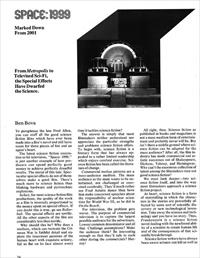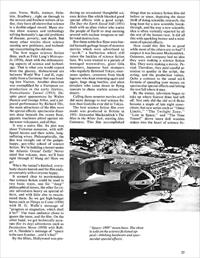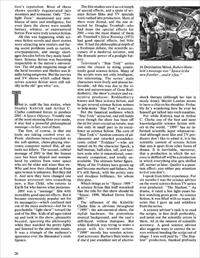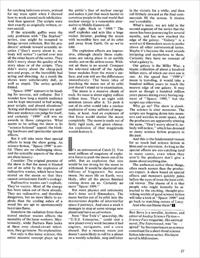Criticism
Space 1999 Marked Down From 2001
by Ben Bova
The critic criticised; by Martin Willey
Ben Bova (1932-2020) was a noted science fiction author who in 1975 was editor of the prestigious magazine Analog. He was asked to write a review of Space: 1999 for the American Film Institute. It was published in American Film, volume 1, number 4, dated January/February 1976, p24. The "Marked down" title was a joke by Mark Chartrand, director of the Hayden Planetarium in New York. The full text of the review is reprinted in Ben Bova's book Viewpoints, published by the NESFA Press and still available, so I've taken the opportunity to criticise the critic...
The latest science fiction execration to hit television, Space: 1999, is just another example of how producers can spend perfectly good money to achieve perfectly dreadful results. The moral of this tale: Spectacular special effects do not of themselves make a good film. There's much more to science fiction than blinking hardware and pyrotechnic explosions.
The bulk of Bova's essay is actually a potted history of science fiction film. While literary science fiction has grown up from it's pulp magazine origins (he alleges), on screen it remains mainly in "gee-wiz" mode. Bova wonders why a medium can recreate the Crimean War in faithful detail cannot handle science fiction, and asserts that filmmakers neither understand nor appreciate the strengths and problems science fiction offers
. He picks out Star Trek as a show that was not only intelligent, but interesting
, due to its creator Gene Roddenberry's knowledge of the genre. But much of what Bova writes could equally be applied to any other genre that has been translated to cinema, Crimean war included. Film is rarely scientifically accurate, but neither is it historically accurate, let alone faithful to the books it adapts to screen. Film is a visual medium; it is limited in the amount of explanation and interpretation it can manage. Condemning film for relying on images, as Bova does, is akin to condemning books for relying on words.
Bova then turns to Space: 1999.
The influence of the Kubrick/Clarke film [2001] is obvious throughout 1999: the astronomical shots, the stylish hardware, the pretentious musical background, and the cast's still-faced, witless dialogues. But while Kubrick was trying to make a point with his wooden actors, 1999 merely has wooden actors. And actresses. Barbara Bain looks as if she's just stumbled out of electroshock therapy (although her hair is nicely done); Martin Landau seems to have a chip on his shoulder. Probably he's wondering how he ever let himself get talked into such inanities.
For while Kubrick had in Arthur C Clarke one of the best and most knowledgeable science fiction writers in the world, 1999 has no informed scientific input whatsoever.
Bova recalls his time as scientific advisor on a series called The Starlost, in which he was completely ignored. If a series doesn't care about science, he argues, it is symptomatic of poor quality, and bad acting and bad scripts follow inevitably.
I wonder how long a sizeable audience can be kept interested in bad acting, poor scripts and absurd situations? Acting and dramatic impact are qualities any audience can judge for itself, and certainly 1999 will win no awards in those categories. What seems to be selling the show is its "science fictional' appeal: the blinking hardware and spectacular special effects.
But it will take more than special effects to keep the show going. As science fiction, Space: 1999 is awful. There are no challenging ideas, and the scientific aspects of the show are sheer lunacy.
Bova then examines the premise of the show, dismissing each element.
Radioactive wastes can't explode. They're wastes. Most of the energy has been taken out of them already. Not only is this lousy science, the entire miasmic concept plays up to the public's fear of nuclear energy.
This was written before several real life accidents when gas build ups in nuclear waste caused explosions. His pro-nuclear stance is also very obviously before Three Mile Island and Chernobyl, which proved public fears and have muted nuclear advocates ever since.
The explosion effects are impressive, although clearly those explosions are taking place in an earthly studio, not on the airless moon. Without air there is no sound.
Bova's point here is a little hard to accept for any drama; it would look very strange to see truly silent space scenes. Even 2001 used music, and Star Trek had the Enterprise passing with a "whoosh".
The moon is a massive chunk of rock. You need millions of megatons of explosive force to push the moon out of its orbit. But an explosion that size would be too strong for the moon to withstand. It would be shattered into billions of fragments. No more moon. Certainly no more Space: 1999.
Bova makes a valid point here, although Asimov was willing to concede it: But that's an error out of dramatic necessity, too, and I'm willing to let it go. The moon has to be gotten out of orbit somehow, and at least a scientific principle was correctly, if exaggeratedly, used for the purpose.
Bova further explains that, unlike Star Trek's Enterprise, the runaway moon rolls by a planet on a weekly schedule. It strains one's credibility.
Which is also valid; Asimov was stronger here and thought it was a more serious, and unforgivable, error. Bova is further worried by the astronomical terminology in the series.
What's more, we are told in the second segment of the series that the moon has been journeying for several months, and has now reached the edge of the galaxy. Certainly they have no concept of what a galaxy is. It would take a hundred million years to reach the edge of our galaxy. It may seem as though a hundred million years passes during every boring segment of Space: 1999 but the scripts say otherwise.
The second episode he saw must have been Dragon's Domain ("we were between galaxies", he also refers to monsters and this was the only Year 1 episode with a monster). Actually there is nothing to presume the writers didn't understand what a galaxy was; if the moon is speeding past so many planets it might as well speed between galaxies as well, it's not much more implausible. But Bova has had enough.
Why go on? The show is dumb. The science is utter nonsense. The scripts are bogging down into monsters and weirdoes in outer space. And the producers are apparently uttering the same, "Don't worry about it; nobody will notice" which has doomed so many science fiction projects in the past.
And this is the fundamental reason for so much bad science fiction in films and television. As long as the special effects are eye-catching (and in many cases, even when they aren't) the producers don't give a damn about anything else.
The audiences notice these things, often much sooner than the producers expect. A show based on special effects and monsters quickly pales before the eyes of even the least critical viewer. The shame of it is that people who might honestly be attracted to the exciting, thought-provoking worlds of good science fiction will take a look at Space: 1999 and go back to watching reruns of Lucy.
And who can blame them?
Bova's thesis is that bad science inevitably means bad television, and so apart from odd jibes at the wooden actors and monster-plots he has little to say about anything other than the science faults. So little, in fact, that no causal relationship is readily apparent. True, producers generally don't care much about science, any more than they care about history or reproducing all the characters and subtleties of a book being adapted for screen. The faults Bova picks out clearly show he does not understand a visual medium; Asimov's reviews are far superior by accepting there are dramatic and commercial necessities that mean compromises must be made.
Bova's type of science fiction tends to concentrate on science, not on character or plot, a failing perhaps equally grievous as a show based solely on special effects and monsters.



